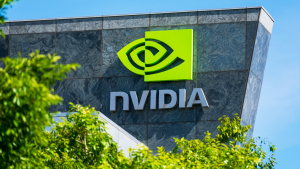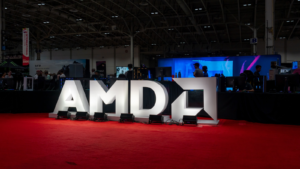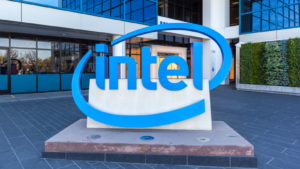The S&P 500 is up more than 50% from 2022 lows. The primary reason for the resilience of the stock market is enthusiasm around AI stocks. Excitement surrounding artificial intelligence and its potential as a revolutionary technology have sent AI shares skyward, creating what many believe is a bubble reminiscent of the dotcom bubble at the turn of the century. That has many wondering whether it’s time to sell.
Valuations and investor exuberance are still not as high as they were during the dotcom crash. Yet, investors continue to wonder whether the similarities are too great to ignore. The inflation of each respective bubble was prompted by the introduction of world changing technology. Investors, eager to secure early gains, have rushed to get their piece of the pie. It’s a recipe for trouble if expectations do not meet reality.
The good news is that important metrics including the 12-month forward price-to-earnings ratios are currently much lower than they were at the dotcom peak. The bad news is that all bubbles are different and unforeseen factors may be at play now that no one can predict until it’s too late.
Nvidia (NVDA)

Nvidia (NASDAQ:NVDA) stock is the most obvious choice among AI stocks to sell before any potential bubble bursts. One of the most obvious reasons to believe that is in the similarity between Nvidia and dotcom champion Cisco (NASDAQ:CSCO).
Cisco shares surged by roughly 4,500% in the 5-year period prior to its peak in 2000. Nvidia’s Shares are up roughly 4,300% over the past 5 years. Whether it’s a coincidence or not, time will tell.
It’s easy to see why investors continue to bet so bullishly on Nvidia following its most recent earnings report from late May. Revenue surged by more than 250% on a year-over-year basis. Sales reached $26 billion, $22.6 billion of which came from data center sales. It all continues to suggest that Nvidia is one of the best investments in AI which is largely seen as a commodity akin to gold for the digital age.
Yet, questions remain about Nvidia and how truly the company is capturing the current opportunity. The truth is that over the past five years Nvidia’s asset growth has outpaced its revenue growth substantially. That’s a real sign that Nvidia’s big bet on AI has not yet produced as substantial results as some may believe. If you need a reason to sell, take that as your signal.
Broadcom (AVGO)

A cursory glance at the stock chart of Broadcom (NASDAQ:AVGO) shows that there are real concerns about a current AI bubble.
Share prices surged above $1,800 by mid June and promptly retreated back below $1,600 one week later. That jump and subsequent decline was seen across most of the AI sector and was a representation of broadly held questions by AI investors. Share prices have rebounded since but the volatility is a clear indication that investors recognize Broadcom may be in the midst of an AI fueled bubble.
Broadcom isn’t a pure play AI stock but the company did mention ‘AI’ 51 times in its most recent earnings call. So AVGO may well be the beneficiary of a halo effect surrounding all things AI.
There are indications that Broadcom internally feels that its share price can’t grow much further. The company has chosen to implement a 10-for-one forward stock split. Such a stock split does nothing to change the fundamentals of the underlying company and primarily serves to increase prices due to psychological effects. Management’s decision to implement the forward split should serve as a clue to investors to sell.
Fundamentals based screening tools suggest Broadcom is significantly overvalued at present. It’s clearly benefiting from the AI halo effect and is at risk as such.
Apple (AAPL)

Apple (NASDAQ:AAPL) stock has come back to life following the Worldwide Developers Conference (WWDC24). AI is partially responsible for the resurgence in share prices at Apple indicating it is highly exposed to AI bubble hype.
Apple introduced two things at the briefly held conference on June 10. Those big upgrades include iOS 18 and the introduction of Apple Intelligence. The company’s massive user base is now poised to receive years of upgrades. That promises to send share prices higher. However, a question arises: how much of that recent surge in share prices is simply AI hype?
It is of course a question that no one can answer currently. Nevertheless, investors remain somewhat cautious. Apple’s revenues are still not as strong as they were a year ago. So, while the introduction of iOS 18 and Apple Intelligence is promising, the company is still facing an uphill battle.
Apple continues to produce substantial cash flows that allow it to satisfy shareholders but if its generative AI efforts prove fruitless it won’t be able to substantiate share prices at this level moving forward.
AMD (AMD)

If the AI bubble bursts, AMD (NASDAQ:AMD) might not look the way investors expect it to.
If AMD’s AI bubble bursts it will really be about investor perception of the company’s inability to capture a greater percentage of sales from Nvidia. The point here is that some analysts see indications of that sort of weak competitiveness indicated at price levels between $116 and $132.
Those price levels may be much higher than many would expect following a bubble burst. Yet, that’s exactly where technical analysts see AMD falling to if it continues to be ineffective in clawing away market share from Nvidia.
AMD Shares are up roughly 14% year-to-date. Those same shares rose from $140 at New Year’s to more than $210 by early March. They now trade for $160. AMD is expected to grow revenues by 14% in 2024. If investors are judging the stock’s performance relative to sales, there might be very little reason to invest in AMD currently.
Microsoft (MSFT)

It’s difficult to argue that Microsoft (NASDAQ:MSFT) is ever a stock to sell. It has provided 10X returns over the past decade and Windows and Office continue to provide a fortress of strength in which the company dwells.
Despite those obvious strengths there are concerns that Microsoft is overpriced at the moment primarily due to AI. Any investor has simply to look at the company’s current P/E ratio of 39x, well above its 10-year median.
How much of that increase in valuation is justified? Is the $30 CoPilot add on worth it? No one really knows because as my colleague Dana Blankenhorn pointed out, Microsoft didn’t break out its performance.
CEO Satya Nadella was happy to boast about its initial uptake earlier this year but not much else has been said since. That’s a troublesome sign. Microsoft is well protected by Windows and Office so any AI bubble burst won’t crush it. However, it may not be a bad time to reap profits now as bubble questions continue to swirl.
Intel (INTC)

Intel (NASDAQ:INTC) stock has sunken like a stone in 2024. Therefore, it probably won’t be too difficult to persuade readers to avoid it moving forward.
There was a lot of hype around Intel due to AI earlier in the year. Intel announced the launch of a systems foundry designed for the AI era in February. That was around the tail end of the time during which Intel was seen as a legitimate competitor to Nvidia.
However, Intel lags well behind Nvidia when it comes to AI chips. Intel’s leading chip is called Gaudi-3. Those chips are supposed to compete with Nvidia’s upcoming Blackwell chips which will be released around the same time. The problem is that Intel’s chips are not nearly as powerful.
The result is that Intel’s opportunity to benefit from the AI halo may already be over. Furthermore, Intel’s revenues peaked in 2021. They’re not expected to rebound to those levels until 2028.
Taiwan Semiconductor Manufacturing (TSM)

Taiwan Semiconductor Manufacturing (NYSE:TSM) is a stock that is at once one of the best investments and one of those which is most exposed to the AI bubble.
It is one of the best investments at the moment because it is so exposed to the AI opportunity. Taiwan Semiconductor manufacturing serves as the world’s foundry, producing the world’s most advanced chips including those for AI applications. It is because of that excellent positioning that the stock has grown by nearly 80% in 2024.
The flip side of that tremendous growth is obvious: Taiwan Semiconductor Manufacturing is also heavily exposed to the inherent dangers of an AI bubble. Given that TSM provides the actual chips sold by Nvidia, AMD and many others, it stands to be punished heavily if and when things go wrong.
TSM’s P/E ratio is currently the highest it’s ever been. It’s more than double its median over the last decade. That’s a bit worrisome given the fact that the company has been the foundry to the world during that period. The hype around AI is the clear reason it’s become so valuable in 2024. As questions continue to swirl about the true value of AI, TSM will continue to be on bubble watch.
On the date of publication, Alex Sirois did not have (either directly or indirectly) any positions in the securities mentioned in this article. The opinions expressed in this article are those of the writer, subject to the InvestorPlace.com Publishing Guidelines.
On the date of publication, the responsible editor did not have (either directly or indirectly) any positions in the securities mentioned in this article.
